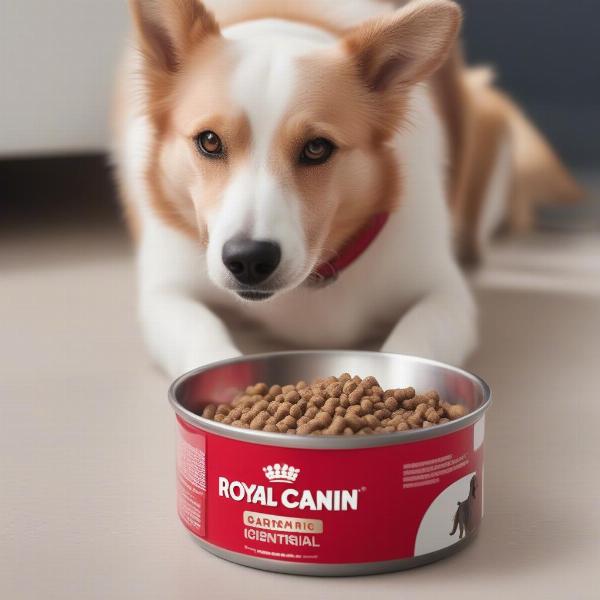Royal Canin Low Fat Gastrointestinal dog food is a specially formulated diet designed to support dogs with digestive issues. This article will delve into the benefits, ingredients, and usage of this specific food, addressing common concerns and providing practical advice for dog owners considering this option for their furry friends. We’ll explore how it can help manage conditions like pancreatitis, inflammatory bowel disease (IBD), and other gastrointestinal sensitivities.
Understanding the Need for Low-Fat Gastrointestinal Dog Food
Many dogs suffer from digestive problems that can significantly impact their quality of life. Conditions like pancreatitis, IBD, and even simple sensitivities can cause vomiting, diarrhea, loss of appetite, and abdominal pain. A low-fat diet is often crucial in managing these conditions as it reduces the workload on the pancreas and digestive system, allowing it to heal and function more efficiently. Royal Canin Low Fat Gastrointestinal is specifically designed to address these needs.
This diet contains highly digestible proteins and prebiotics to support healthy gut flora, further aiding in digestion and nutrient absorption. By choosing a food like Royal Canin Low Fat Gastrointestinal, you’re providing your dog with the nutritional support they need to recover and thrive.
Key Benefits of Royal Canin Low Fat Gastrointestinal Dog Food
Royal Canin Low Fat Gastrointestinal dog food offers numerous advantages for dogs with digestive sensitivities. Its low-fat content is the primary benefit, easing the strain on the pancreas and intestines. The highly digestible proteins ensure your dog receives essential nutrients without further irritating their digestive system.
 Dog Eating Royal Canin Low Fat Gastrointestinal Dog Food
Dog Eating Royal Canin Low Fat Gastrointestinal Dog Food
Additionally, the inclusion of prebiotics fosters a healthy gut microbiome, promoting optimal digestion and overall well-being. This specialized formula aims to alleviate symptoms like vomiting and diarrhea, improve appetite, and support a healthy weight.
Ingredients and Nutritional Profile
Royal Canin Low Fat Gastrointestinal is formulated with specific ingredients chosen for their digestibility and nutritional value. Key ingredients often include highly digestible proteins like hydrolyzed chicken liver and rice, sources of soluble fiber, and a blend of vitamins and minerals to ensure complete nutrition. The precise formulation may vary slightly depending on whether you choose the dry kibble or canned wet food option.
royal canin low fat gastro dog food
It’s essential to consult your veterinarian to determine the appropriate form and amount of food for your dog’s specific needs.
Transitioning Your Dog to Royal Canin Low Fat Gastrointestinal
When introducing any new food, a gradual transition is crucial to avoid further digestive upset. Start by mixing a small amount of Royal Canin Low Fat Gastrointestinal with your dog’s current food, gradually increasing the proportion of the new food over several days. This slow transition allows your dog’s digestive system to adjust to the new diet. Monitor your dog closely for any signs of digestive issues during the transition period.
If you notice any adverse reactions, consult your veterinarian immediately.
Is Royal Canin Low Fat Gastrointestinal Right for Your Dog?
While Royal Canin Low Fat Gastrointestinal is a beneficial option for many dogs with digestive issues, it’s important to consult with your veterinarian before making any dietary changes. They can accurately diagnose your dog’s condition and recommend the most appropriate diet based on their specific needs.
Conclusion
Royal Canin Low Fat Gastrointestinal dog food offers a tailored solution for dogs struggling with digestive sensitivities. Its low-fat content, highly digestible proteins, and prebiotic support contribute to improved digestion and overall well-being. Remember to consult your veterinarian for personalized advice on whether this diet is suitable for your furry companion.
FAQ
- How long should my dog stay on Royal Canin Low Fat Gastrointestinal? This depends on the underlying condition and your veterinarian’s recommendation. Some dogs may require it long-term, while others may only need it for a specific period.
- Can puppies eat Royal Canin Low Fat Gastrointestinal? There is a specific puppy version of this food, consult your vet for guidance.
- Is Royal Canin Low Fat Gastrointestinal expensive? It is a premium therapeutic diet, so it is typically more expensive than standard dog food.
- Where can I buy Royal Canin Low Fat Gastrointestinal dog food? It’s available at most pet stores and online retailers, as well as through veterinary clinics.
- What if my dog doesn’t like the taste? Try mixing it with a small amount of warm water or bone broth (low-fat) to enhance palatability.
- Can I give my dog other treats while they’re on this diet? Consult your veterinarian before offering any treats or supplements, as they may interfere with the diet’s efficacy.
- What are the signs that my dog’s digestive issues are improving? Look for improvements in appetite, stool consistency, reduced vomiting and diarrhea, and increased energy levels.
ILM Dog is a leading online resource dedicated to providing dog owners worldwide with reliable, practical information on all aspects of dog care. We offer expert advice on breed selection, health and medical care, training and behavior, nutrition, grooming, and much more. From puppy care to senior dog care, we cover everything you need to know to ensure your furry friend lives a long, healthy, and happy life. For personalized advice or more information about our services, contact us via email at [email protected] or call us at +44 20-3965-8624. ILM Dog is here to support you and your canine companion every step of the way.